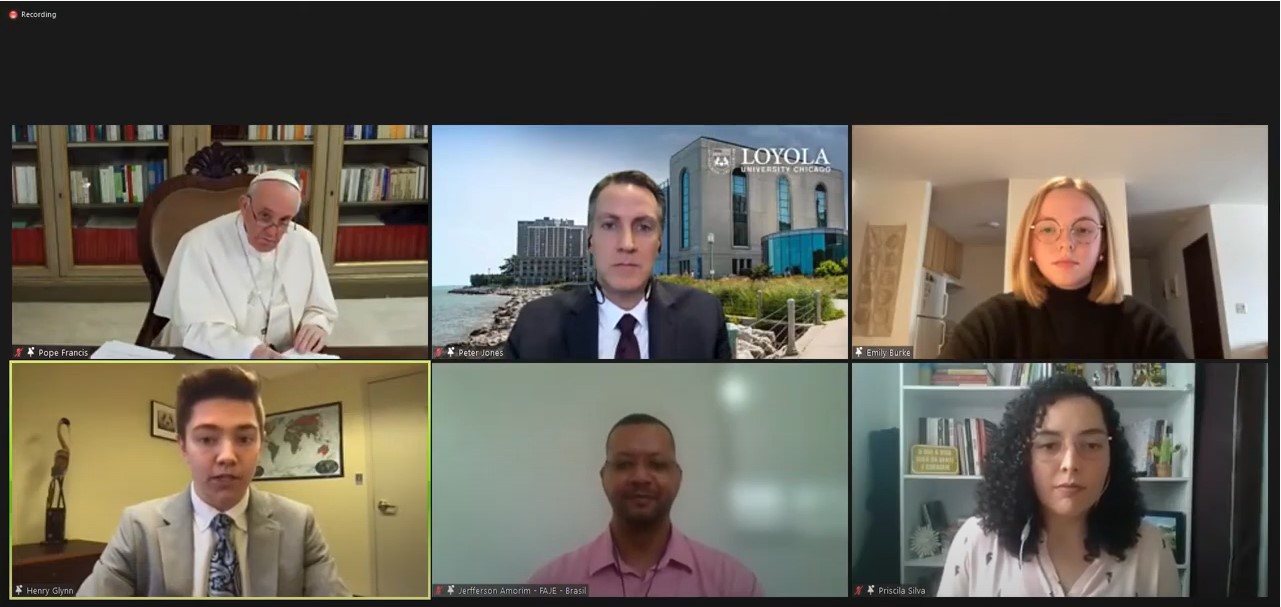
Screenshot of YouTube recording of the Feb. 24 online forum between students and Pope Francis shows Creighton University student Henry Glynn, lower left, and Creighton graduate Emily Burke, upper right.
News
Creighton University student and recent grad discuss global issues with Pope Francis via Zoom
February 26, 2022
A current student and a recent graduate from Creighton University in Omaha had the experience of a lifetime on Feb. 24 – a Zoom meeting with Pope Francis.
The pope hosted several students from North and South America in the online forum, which focused on the issues of poverty, climate change and mass migration.
Titled “Building Bridges North-South: A Synodal Encounter Between Pope Francis and University Students,” the forum was hosted by Loyola University Chicago and included a greeting from Cardinal Blaise Cupich of Chicago, an Omaha native.
The Catholic students – Henry Glynn, a junior at Creighton, and Emily Burke, a 2021 graduate who is now in graduate school at the University of Wisconsin-Madison – are both passionate about the issues that were the focus of the forum.
They became involved through the recommendations of two instructors at Creighton and spent the previous month in a working group with about 20 other students from a variety of countries, discussing ways that young people like themselves could make an impact. Their fellow students chose them to represent the group’s views during the forum with the pope.
Both Burke and Glynn said they were nervous going into the meeting.
“Nervous is kind of an understatement,” said Burke, a Milwaukee native who’s working on a doctorate in environmental sociology.
“It felt like a big deal,” she said of their roles. “We knew we had this international stage, which was kind of intimidating, but also really empowering and cool, that the Catholic Church was listening to young people.”
“I think everybody was a bit more calm because Pope Francis was really affirming,” Burke said.
“He took a bunch of notes and then directly responded to us, which felt so special,” said Glynn, who hails from Sabetha, Kansas, and is spending a semester in Washington, D.C., as an intern for the nonprofit Catholic Climate Covenant.
“Just being there … and being part of the planning process and having this opportunity was such a unique thing,” he said. “It’s something that will never happen again in my entire life, right? I got to be in a Zoom call with Pope Francis and talk right to him.”
Being a part of the forum was also a lot of responsibility, both students said.
“We tried hard and were really prepared,” Glynn said. “We were really pleased with the response as well. He (Pope Francis) affirmed that the Church doesn’t necessarily take enough of a strong position on these issues.”
During the Zoom conference, Glynn discussed climate change as a root cause of migration and the power of the Church to use its resources to mitigate climate change.
Burke spoke about raising awareness in the Church, particularly among bishops, and about people using nonviolent forms of demonstration to get the issue of climate change prioritized by their governments.
The pope encouraged the students’ efforts.
“He stayed very high level,” Glynn said, encouraging sincerity and not hypocrisy in the students’ efforts. “He really encouraged our idea of this nonviolence, saying that is a way of sincerity.”
Both students say the forum is just a beginning. “We’re having these synodal conversations about these issues,” Burke said, “and we’re proposing ideas and concrete solutions. So let’s not stop it there. I don’t think anybody really knows what that’s going to look like yet, but in the spirit of synodality, I think, people are just waiting to see what emerges.”
Both Glynn and Burke said they are grateful for their roles.
“The bottom line is that this was just an incredible opportunity,” Glynn said.
“It’s something I’ll never forget,” said Burke. “It’s totally unforgettable.”